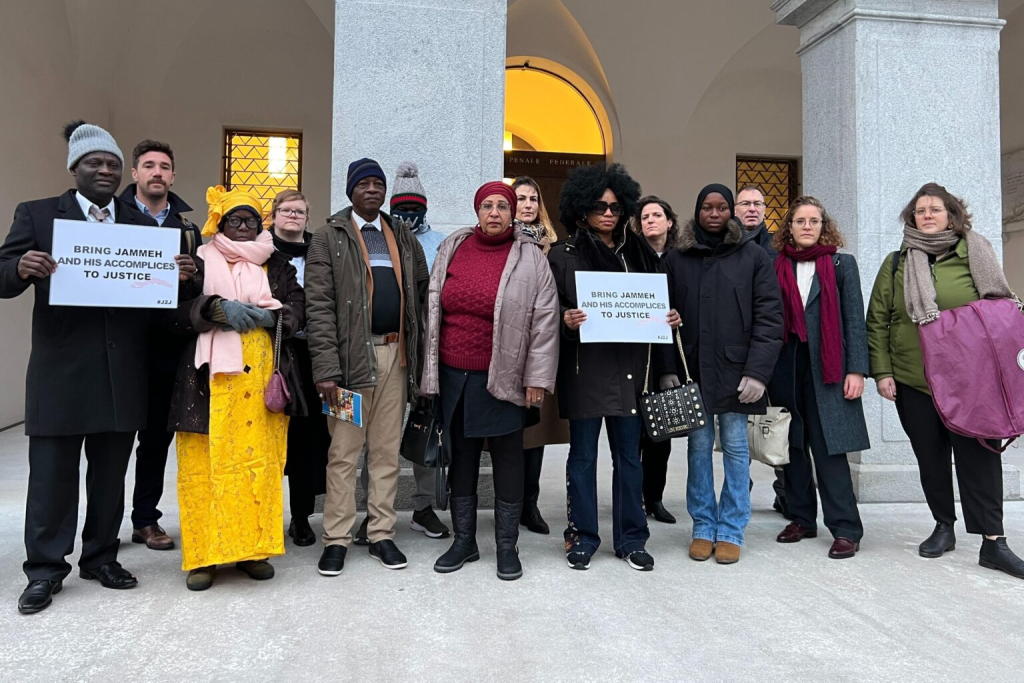
Day 3: Examination of the early 2000s charges
(murder of Almamo Manneh and multiple rapes as crimes against humanity)
Ousman Sonko is being accused of having participated in the murder of Almamo Manneh in January 2000 and, consecutively, having repeatedly raped his widow between the years 2000 to 2002 as well as to have tortured, raped and sequestrated her in 2005.
The accused explained that he was bound by a professional secrecy that prevented him to talk about Almamo Manneh’s facts and contested all the rape charges, claiming that he was not in the country at the time of the events.
The Court then proceeded in the hearing of Almamo Manneh’s widow. Her lawyer requested Ousman Sonko to be placed in a separate room, so that the plaintiff would not be directly confronted with him during her interrogation. Given the sexual offenses at stake, the female judge led the examination.
Upon question from the Court, the plaintiff confirmed all the declarations she had made before the federal Prosecutor in 2019 (during the course of the investigation). She then explained not having known anything about the alleged coup her husband had been suspected to have fomented against the former President. During the night of the killing, her late husband received a phone call from Ousman Sonko and then left their house. She had never seen him again.
Questioned on the acts of sexual violence she endured, the plaintiff confirmed that from January to June 2000, Ousman Sonko had been abusing her “frequently” and “intensively”, while in 2001 the violence became less regular. She had to go through two secret abortions – against her will – during this period of time, while aborting was illegal in the country. In 2005, she was raped in addition to be severely beaten. During this event, Ousman Sonko had been questioning her on the reasons why she had flown to the USA. She felt “mentally disturbed” and suffered heavy physical consequences from the multiple assaults she had gone through.
She also recalled that from the mid 1990s, it was hell for any Gambian who was opposing the Government. After her testimony before the TRRC, she had been contacted by many women who had also been sexually assaulted by members of the government or the state apparatus. A lot of Gambian women were scared to come out and their stories were not believed. Herself felt she was not fitting within the Gambian society after coming out with her story. She nevertheless found the strength to do so thanks to her children.
Brought back before the Court, after having explained that he was not aware of the reasons why Almamo Manneh would have planned a coup, Ousman Sonko repeated several times that he was bound by a professional secrecy and could not comment further. He did however state that he did not know about the President’s reaction upon the news of Manneh’s death. Confronted with the fact that the TRRC found him responsible for the murder of Almamo Manneh, Ousman Sonko stated that he had not seen his name in TRRC compendium volumes A or B.
Ousman Sonko was then confronted with a series of Gambian newspaper articles published after Manneh’s killing, referring notably to an “official release on a coup attempt” from the Department of State for the Interior. The accused said he did not know about the substance of this so-called release. According to him, these articles about the coup were in fact the demonstration that Gambian press was free.
He explained that he was in Sierra Leone for a UN engagement between 6 January 2001 and 21/22 January 2002 and only came back once to The Gambia, for a break, during this period of time. The Court informed the parties that mutual legal assistance had been requested to the UN to confirm the breaks taken by the accused and that it was waiting for an answer.
Coming next: Hearings on the March 2006 alleged coup plotters’ torture events.


